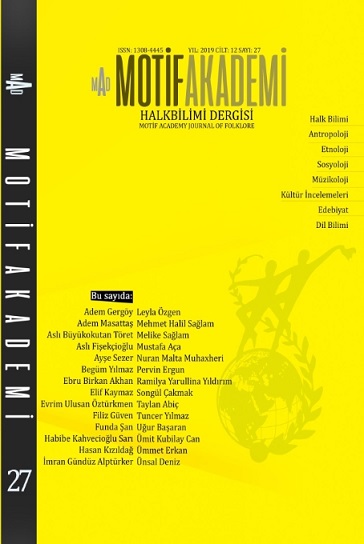SLOW FOOD HAREKETİNE UYGUN BİR İÇECEK: TÜRK KAHVESİ
A DRINK BEFITTING THE SLOW FOOD MOVEMENT: TURKISH COFFEE
Author(s): Leyla Özgen, Pervin Ergun, Elif KaymazSubject(s): Cultural history, Customs / Folklore, Ethnohistory, Social history, Cultural Anthropology / Ethnology, Sociology of Culture
Published by: Motif Halk Oyunları Eğitim ve Öğretim Vakfı
Keywords: Slow food beverage; hybridization; Turkish coffee; culture;
Summary/Abstract: Originally just boiled before consumption by Arabic people, Turkish coffee - roasted, ground and brewed slowly on low heat - can be considered the first slow coffee in the contemporary sense. Coffee spread to the world via the Turks and it is so thoroughly identified with Turkishness that many nations tried to implement measures, especially through religious and national identity codes, to prevent the dissemination of Turkish culture. In time, Turkish coffee was gradually influenced by the growing coffee culture across the globe, particularly with the emergence of take away coffee, which can be regarded as an indication of both the transformation of Turkish coffee into instant coffee and the incipience of its hybridization. Alongside this hybridization tendency, Turkish coffee has also been the subject of efforts to designate and preserve its characteristic standards. Turkish coffee characteristics are very suitable for the Slow Food Movement, which was founded in Italy as a reaction to fast food, particularly with regard to preserving regional and national cuisines and protecting agricultural biodiversity. Both the method of slow brewing on low heat and the tradition of slow drinking - due to its hotness and function as an instrument of conversation - of Turkish coffee must be observed and sustained as a 500-year historical heritage as a part of the Ottoman palace cuisine. Turkish coffee can be characterized as a beverage that befits the philosophy of “good, clean and fair food” of the Slow Food Movement. Concordantly, symposiums, conferences and workshops must be organized in the scope of eco-gastronomic tourism to provide visual presentation of Turkish coffee preparation, brewing and service, meanwhile performing each ritual as part of the intangible cultural heritage of Turkish coffee.
Journal: Motif Akademi Halkbilimi Dergisi
- Issue Year: 12/2019
- Issue No: 27
- Page Range: 624-636
- Page Count: 13
- Language: Turkish

